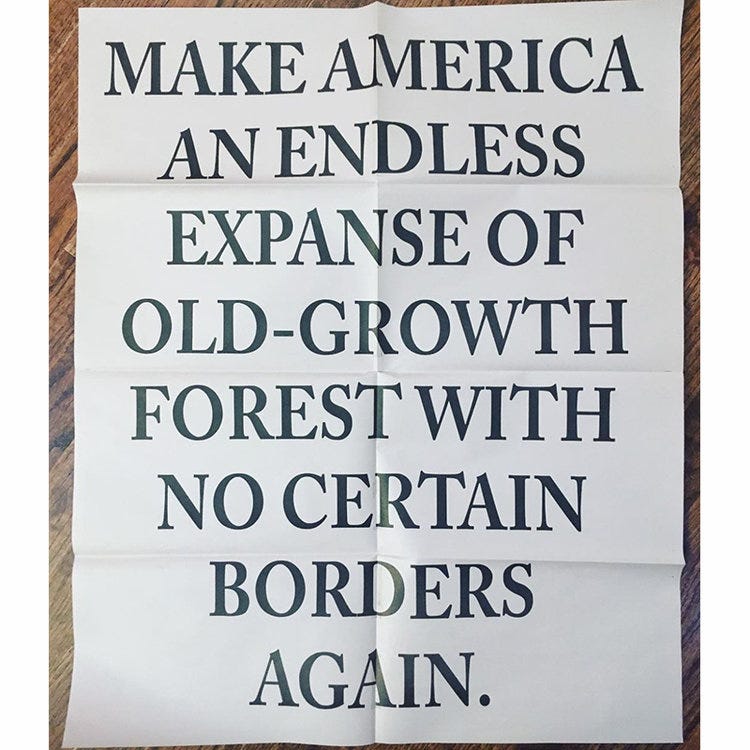make america an endless growth of old growth forests

newsprint poster by lydia moyer & tero juuti
Local.
Stay local.
That’s what I keep hearing — that that’s where the power to make change is.
And then I read the news, as you read the news, and I am shattered all over again and I forget to stay local.
I scramble about, make the calls, write the emails, send more money, pound my fist, and scream into the pillow.
Local.
Stay local.
Okayokayokayokayokay...I’m swinging toward local.
Have no idea EXACTLY what that means on a practical level, and in real time, but I’m opening up windows and doors to find out.
And perfectionism.
This is no time for perfectionism.
I keep hearing that too:
Mistakes will be made, things will be said in the wrong way, the event won’t turned out as planned, best practices won’t always be in play, and strategies will be faulty — keep showing up anyway.
Also, that our joy is our birthright: even now and more than ever.
From my favorite thinker of our time, Rebecca Solnit:
“When you face a politics that aspires to make you fearful, alienated and isolated, joy is a fine act of insurrection.”
Actions for this week then:
Include the local in your activism, whatever that means to you
Let go go of perfectionism.
Joy…as much as we are able.
And this, which gives me hope: RAICES in Texas
And this, which gives me more.: CASA DE PAZ in Aurora (localish!).
And this last quote from Rebecca, ‘cause I just can’t stop reading her words!
“Resistance is first of all a matter of principle and a way to live, to make yourself one small republic of unconquered spirit. You hope for results, but you don't depend on them.” ― Rebecca Solnit, Hope in the Dark
From one small republic of an unconquered spirit, to another.
With Warmth,
Joanna
PS:
This is happening tonight:
Resisting unjust immigration policies: Lessons from the borderlands
Longmont: Monday, July 23, 6:00pm
Philanthropiece Foundation
6105 Monarch Rd
Staff from BorderLinks will lead a discussion about the importance of grassroots organizing in resisting recent changes in US immigration policy. We’ll share examples from the work of people directly affected by border enforcement and immigration policy in Southern Arizona and describe how BorderLinks’ educational programs focus on root causes of migration and equip people to develop deeper relationships with local communities.
BorderLinks was formed as the educational arm of the Sanctuary Movement in Tucson, Arizona, in 1988. For 30 years we have provided experiential education about migration justice issues, helping church and university delegations from around the US develop an indepth understanding of the root causes of migration, the hazards migrants face, and what can be done to support migrants around the US. We bring to the forefront of the debate the voices of people who are directly affected by US immigration policies. BorderLinks helps strengthen migrant justice efforts around the country through education.
https://www.borderlinks.org/

